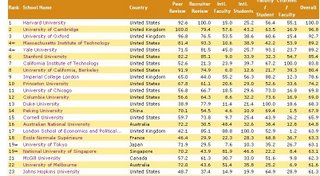
Really? Let's take a closer look. Of course, if you look at the breakdown of the scores, which is available at the THES website for subscribers, you will realise that NUS does very well in criteria like 'international faculty', 'international students' and 'peer review' and rather poorly on things like 'citations per faculty'.
In terms of international faculty and international students, NUS and NTU have some of the highest scores. However, the high marks given are misleading. Allow me to explain why. In most universities, the presence of international students is regarded as a good thing because they correlate to the quality of the university. The general idea is that the better the university is, more foreign students would be willing to pay the extra fees to go there. For example, a Singaporean students looking to study in the US would generally prefer to go to the best place he or she qualifies for given the very high cost of education. People naturally prefer some place like Berkeley or MIT over Podunk University, if they can get in. The idea is that since you're paying so much for your education, you would want a place that gives you more bang for your bucks. Therefore, it is quite natural for THES to accord a significant positive weight to the number of foreign students in a university since most universities do not go out of their way to bring in foreign students just for the sake of bringing them in.
Of course, the situation is not like that in Singapore. NUS and NTU have a large number of foreign students not because of any intrinsic superior quality of their education but because the government effectively bribes a large number of foreign students with subsidised tertiary education and scholarship to study there. So, you see, the legions of foreign students in NUS are not a testimony to how great the university is but are really there because people are financially incentivised to go there. If you remove that component of that score, I suspect that NUS and NTU's rankings will drop drastically because few people would go to NUS paying full fees. That is not quite so for other universities such as LSE or UNSW with very high scores for international students. Foreign students go there paying full fees. Hence, their presence is a reliable indicator of the quality of these universities.
If you look at the 'citations per faculty' score, NUS does badly, which indicates that the quality of their research is not commensurate with their ranking. Of course, this ranking is not merely about the research performance of universities. Also, the 'citations per faculty' has a time lag factor and is calculated by looking at citation records from ESI over a 5-year period. To be fair to NUS, if there was a quantum leap in the quality of its research in the last two or three years, the ranking would not reflect that although it would show up in the ranking in 2009, provided that the same ranking criteria were used.

7 comments:
The link is broken.
What is UIUC's ranking? I heard it has dropped to 77th.
Frankly, I think general university rankings are only of concern to those who intend to go into jobs whereby prestige matters a lot. I got a good job fine in the city of my choice with a degree from a university that is not within the top 20 of this ranking. And actually, I much prefer this environment to one where preening is necessary for survival.
And universities aren't good across departments - if you want a solid education in say, engineering, drowning in corn for a few years would be preferable to say, the slums of New Haven. The Big State University With a Forever Losing Football Team in this little mountain town that I live in houses (one of?) the best program in the country for A Very Specific Subfield in A Particular Subject, but the undergrad class with the highest passing rate is Marijuana 101.
I think the administrators of Singapore universities do value such ranking exercises very much and it has a considerable impact on how the universities are run. This will actually affect local students studying in Singapore.
For example, since peer review, which depends on reputation, is such an important criterion, a university administrator may push to have more tie-ups with top universities a la the Singapore-MIT alliance so that their research becomes better known to others. Another example is the weight the ranking attaches to the numbe of foreign students. It is not inconceivable that universities may try to recruit more foreign students through scholarships.
When funds are diverted to play the ranking game, other areas may suffer.
So for the sake of nice rankings, local students are being pushed out? That's nice. Rankings like these are ridiculous and there should be more emphasis on the research a school does.
Ah well, rankings like these are for people who don't do enough research on the universities they go to.
The peer review criterion of the THES ranking is flawed. Refer to
http://en.wikipedia.org/wiki/THES_-_QS_World_University_Rankings
The peer review favours universities which subscribe to World Scientific (Based in Singapore).
See evidence here
http://rankingwatch.blogspot.com/2006/09/so-thats-how-they-did-it-for-some-time.html
"Improvement" in rank does not always go with "improvement" in Overall score which is an indication of improved quality. The are cases of opposite "improvement's in rank and score.
By the way, for Citations (which is an indication of research/publication quality), NUS has 204 in the QSWUR.
Post a Comment